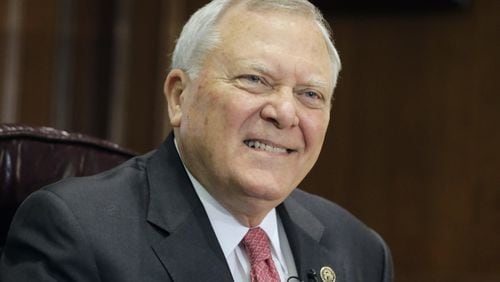Gov. Nathan Deal plans to put all his political might behind a measure that would give the state more power to intervene in persistently struggling schools, saying in an interview Friday that he is unlikely to push a more sweeping plan to overhaul the school funding formula until it passes.
Declaring himself undeterred by the November defeat of his Opportunity School District initiative, Deal told The Atlanta Journal-Constitution that he is working with lawmakers on a plan that would give the state more power to let students transfer from the 153 schools on the state’s failing list.
“Sometimes it takes more than one bite of the apple to get it right,” he said of the failure of his proposed constitutional amendment, which would have empowered his office to take control of failing schools. “Sometimes there are literally more ways than one to skin the cat, and we’re still trying to skin the cat of chronically failing schools.”
That means that an ambitious, and politically perilous, plan to overhaul the school funding formula will probably be delayed another year. Deal made rewriting the 31-year-old formula the centerpiece of his re-election campaign in 2014, but he shifted to the failing schools initiative shortly after his victory.
“It’s not necessarily on the back burner, but the first and most important thing is to deal with chronically failing schools,” he said of a funding overhaul. “And if we do not deal with chronically failing schools, rewriting the formula does not do anything to solve the biggest problem we have in public education.”
Some of Deal’s critics are already drawing battle lines. Verdaillia Turner, the head of the Georgia Federation of Teachers, said the governor is defying the will of the voters by pushing the legislation after nearly 60 percent rejected it.
“His agenda is not about improving schools,” she said. “The governor is laying the groundwork for whomever he and his minions have tapped to succeed him.”
It was Deal's first extensive comments about his education initiatives since November. Although there were few specifics, Deal is likely to have key legislative support for his initiative. House Speaker David Ralston and Lt. Gov. Casey Cagle both this week endorsed the idea of developing a new failing schools plan.
Cagle said the plight of students in struggling schools was “unacceptable” to him and other Senate lawmakers, while Ralston said Georgia voters expect lawmakers to take action.
“Putting aside all the rhetoric and debate over the constitutional amendment we just came through, the fact remains we still have almost 70,000 children in failing schools in Georgia,” Ralston said. “What we do about that is going to be important to me, it’s going to be important to the House.”
A group of House Republicans has already drafted an initial plan, which could involve a six-year process that would offer the state’s most troubled schools more administrative support and additional resources. If performance doesn’t improve, students could be offered vouchers or state help in switching to other schools.
The measure would be designed to avoid the legal questions raised by a 2011 Georgia Supreme Court ruling that concluded that only county and area school boards have the explicit authority to create and maintain charter schools.
Deal also wants it to focus on elementary schools — which form the bulk of the schools on the state’s failing list — and give the state more ways to hold administrators accountable.
“It goes to fiscal responsibility,” he said. “You need to be sure that the schools receiving these funds are using them appropriately, and many of them have had difficulties with audits and complying with deadlines for reporting.”
The governor needed a few Democratic votes in the Legislature for his Opportunity School District constitutional amendment, which required a two-thirds margin to be placed before the state’s voters. But unless a raft of rank-and-file Republicans abandon him — and many are still smarting over his vetoes last year of contentious legislation — he might not need much support from across the aisle.
Still, Democrats are taking a wait-and-see approach with the legislation. House Minority Leader Stacey Abrams, the chamber's top Democrat, said she hopes it incorporates some of her own priorities.
“Saving struggling schools and the children they serve is a Democratic priority,” she said. “Any solution must combine accountability with resources and support for educators grappling with chronic poverty and its effects on young minds and bodies.”
The governor, meanwhile, didn’t rule out making a final push in 2018 — his last year in office — to revamp the complicated school funding calculus. And he said he didn’t want the failing schools measure that emerges over the next weeks to be known as a backup plan.
“There is no Plan B. Plan A has always been to help fix chronically failing schools,” he said. “And that remains my focus this year.”
About the Author








